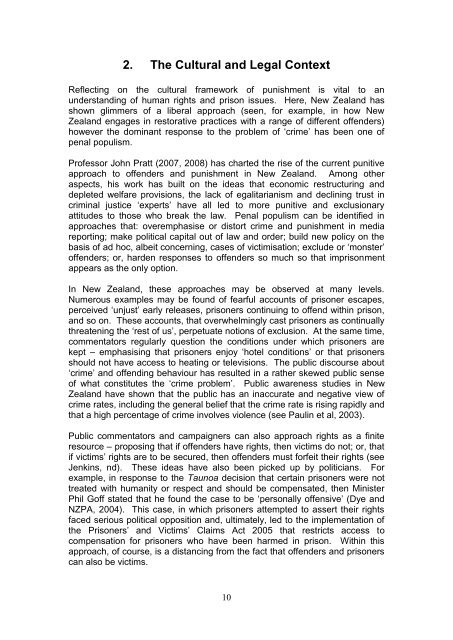Human Rights and Prisons - Rethinking Crime and Punishment
Human Rights and Prisons - Rethinking Crime and Punishment
Human Rights and Prisons - Rethinking Crime and Punishment
Create successful ePaper yourself
Turn your PDF publications into a flip-book with our unique Google optimized e-Paper software.
2. The Cultural <strong>and</strong> Legal Context<br />
Reflecting on the cultural framework of punishment is vital to an<br />
underst<strong>and</strong>ing of human rights <strong>and</strong> prison issues. Here, New Zeal<strong>and</strong> has<br />
shown glimmers of a liberal approach (seen, for example, in how New<br />
Zeal<strong>and</strong> engages in restorative practices with a range of different offenders)<br />
however the dominant response to the problem of „crime‟ has been one of<br />
penal populism.<br />
Professor John Pratt (2007, 2008) has charted the rise of the current punitive<br />
approach to offenders <strong>and</strong> punishment in New Zeal<strong>and</strong>. Among other<br />
aspects, his work has built on the ideas that economic restructuring <strong>and</strong><br />
depleted welfare provisions, the lack of egalitarianism <strong>and</strong> declining trust in<br />
criminal justice „experts‟ have all led to more punitive <strong>and</strong> exclusionary<br />
attitudes to those who break the law. Penal populism can be identified in<br />
approaches that: overemphasise or distort crime <strong>and</strong> punishment in media<br />
reporting; make political capital out of law <strong>and</strong> order; build new policy on the<br />
basis of ad hoc, albeit concerning, cases of victimisation; exclude or „monster‟<br />
offenders; or, harden responses to offenders so much so that imprisonment<br />
appears as the only option.<br />
In New Zeal<strong>and</strong>, these approaches may be observed at many levels.<br />
Numerous examples may be found of fearful accounts of prisoner escapes,<br />
perceived „unjust‟ early releases, prisoners continuing to offend within prison,<br />
<strong>and</strong> so on. These accounts, that overwhelmingly cast prisoners as continually<br />
threatening the „rest of us‟, perpetuate notions of exclusion. At the same time,<br />
commentators regularly question the conditions under which prisoners are<br />
kept – emphasising that prisoners enjoy „hotel conditions‟ or that prisoners<br />
should not have access to heating or televisions. The public discourse about<br />
„crime‟ <strong>and</strong> offending behaviour has resulted in a rather skewed public sense<br />
of what constitutes the „crime problem‟. Public awareness studies in New<br />
Zeal<strong>and</strong> have shown that the public has an inaccurate <strong>and</strong> negative view of<br />
crime rates, including the general belief that the crime rate is rising rapidly <strong>and</strong><br />
that a high percentage of crime involves violence (see Paulin et al, 2003).<br />
Public commentators <strong>and</strong> campaigners can also approach rights as a finite<br />
resource – proposing that if offenders have rights, then victims do not; or, that<br />
if victims‟ rights are to be secured, then offenders must forfeit their rights (see<br />
Jenkins, nd). These ideas have also been picked up by politicians. For<br />
example, in response to the Taunoa decision that certain prisoners were not<br />
treated with humanity or respect <strong>and</strong> should be compensated, then Minister<br />
Phil Goff stated that he found the case to be „personally offensive‟ (Dye <strong>and</strong><br />
NZPA, 2004). This case, in which prisoners attempted to assert their rights<br />
faced serious political opposition <strong>and</strong>, ultimately, led to the implementation of<br />
the Prisoners‟ <strong>and</strong> Victims‟ Claims Act 2005 that restricts access to<br />
compensation for prisoners who have been harmed in prison. Within this<br />
approach, of course, is a distancing from the fact that offenders <strong>and</strong> prisoners<br />
can also be victims.<br />
10
















